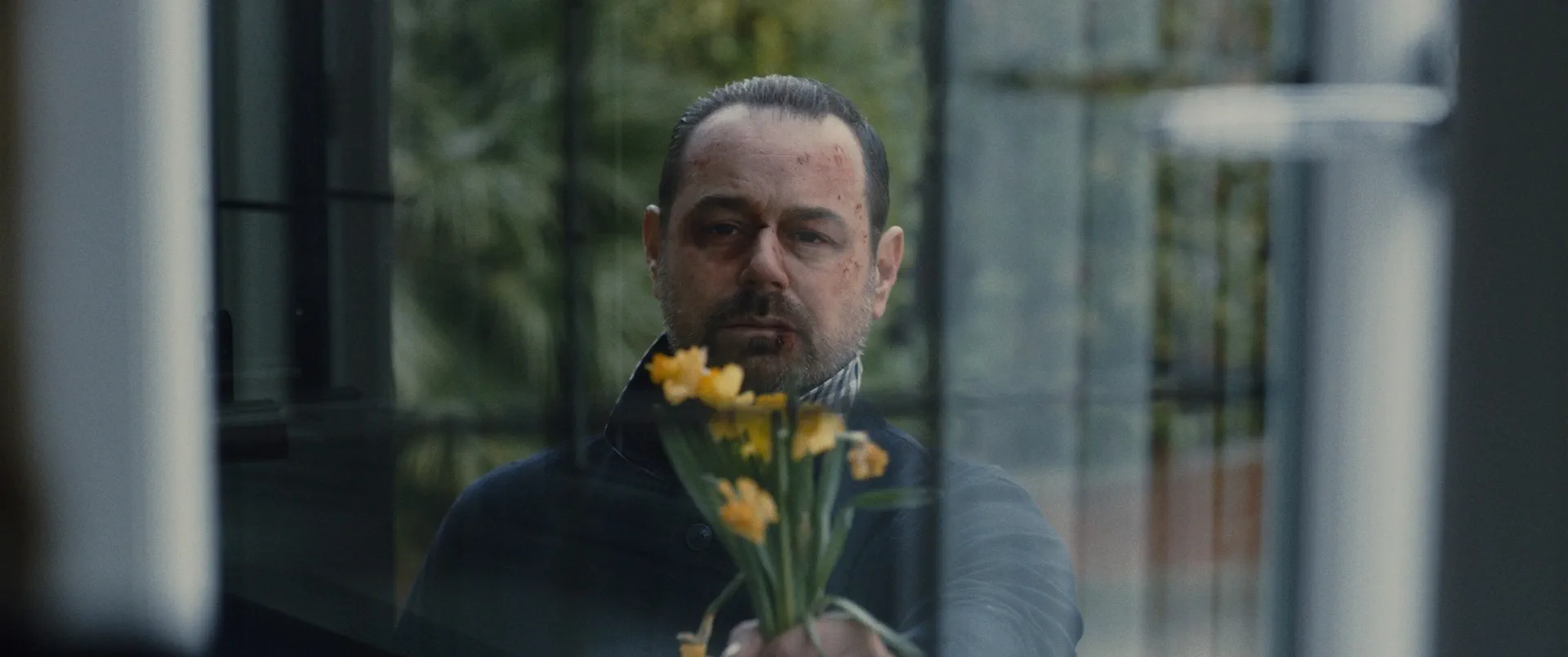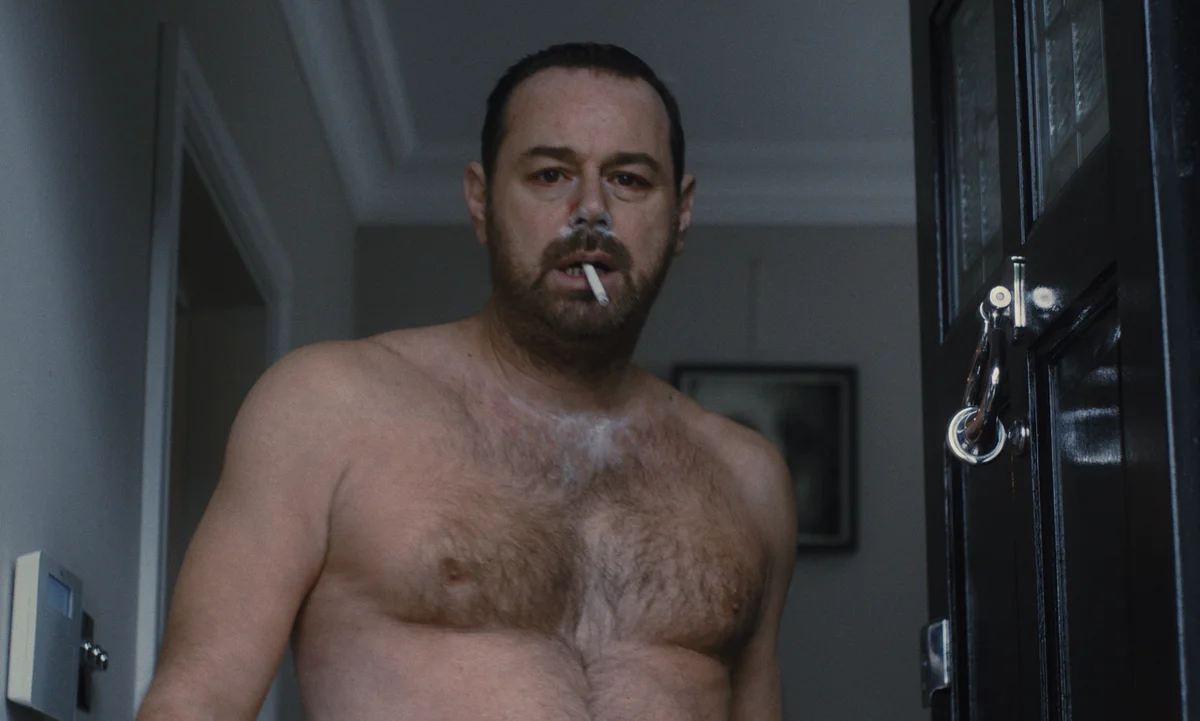Marching Powder (2025) is British icon Danny Dyer’s return to the big screen with past collaborator Nick Love, and it’s also the first film that has felt reflective of Keir Starmer’s Britain. A crushed velvet, hyper machismo, misanthropic ninety minutes that is as dull as it is mean-spirited and dated. The film follows Jack Jones (Dyer), a forty-year-old grumpy cocaine addicted football hooligan who is now forced to turn his life around after all his violent, misanthropic behaviour and substance abuse catch up to him.
He gets told by a judge he has six weeks to become a new man, or he gets thrown into jail. His wife left him, taking the kids. What follows is a film that feels repetitive, dated, and cynical to a fault. For a comedy, it’s not very funny. It’s mean-spirited in the most boring way possible. The anger the film holds is something very perplexing; it truly feels like a 2008 Time Capsule, taking boring pot shots at hipsters, artists, the trans community, and minorities. Look, if you are gonna try to be edgy, at least be actually funny instead of shouting profanity every few seconds and more or less recycling the worst jokes you’d hear down the pub on a Wednesday at 4 pm.
This feels less like a unique look at British culture and more like a dull rehash of “Trainspotting” and “The Football Factory” in the vein of a crushed velvet-covered ugly new build. I knew this film would feel dated, but I was hoping it would feel dated in a way that harkens back to early 2000s british cinema, but this feels dated in the same way hearing a slur on broadcast tv feels dated or being told by an old white man in reference to your skin tone that “your one of the good ones”.
From the first two minutes, which feature some pretty bland animation with an art style that reminds me of WikiHow, you can tell what sort of film this is going to be. Very quickly it becomes clear this is a film that thinks it’s satirising the modern geezer life style (day drinking, beating up other men because of football, heavy substance abuse and being a deadbeat dad) but is too scared to say anything meaningful as it doesn’t want to alienate the same people it’s trying to satirise/confront. It’s supposedly a film about changing times, but it already feels like a relic. The film’s humour, politics, and caricatures make you slump into your seat and roll your eyes.

Just constant lowest common denominator humour that revels in dull cynicism, I feel like I was hearing the same joke played on loop for ninety minutes. Sure, one or two moments made me smirk, but that’s a pretty abysmal hit rate for a comedy film. The whole experience is coated in a sense of irony, a film about change. However, every joke feels like it’s doing its best to appeal to people who are permanently stuck in 2010 lad culture. For a film about a man trying to change, it’s pretty frustrating that he doesn’t actually change; there’s not really a character arc, Jack learns nothing, and we end at the exact same point as we started from. There’s no real payoff, there is no real consequence to anything.
The same sequence of events just plays out again and again until the film ends. Jack Jones says he’ll be better, but he ends up indulging in his vices once again, he does something foolish, hurting his (insert father-in-law, wife, son), and then the matter is quickly resolved. Rinse and repeat for 90 mins, and you get “Marching Powder.” It’s not as if Nick Love’s screenplay is condemning or saying anything about this cycle of self-destruction. It’s almost cheering it on, acting as an attempt to reassure those with a similar lifestyle that what they do is actually cool and that everyone else is wrong. This somewhat mad viewpoint would’ve been interesting to see if the film screenplay had any sense of intentionality.
The screenplay loves its lead character so much to the point where he faces no real consequence. He doesn’t change, nor do we ever really get to understand why he sees the world the way he does. We never get to understand why his wife sticks with him and loves him so much, we never understand why he has such a hatred for more or less everyone and everything, or why he loves beating up other men because of football.
The film really draws a blank when it comes to having any sense of character interiority. We are stuck with someone who is so one-note and dull, there’s no inner turmoil. There’s no weight to anything. Instead we have Danny Dyer trying his damn best to breathe life into a dull caricature. The film can’t bring itself to say anything really about the subject matter it wants to tackle in what is very clearly a dreadful attempt to have its cake and eat it. Much like Starmer’s Labour Marching Powder’s promise of change rings hollow, and instead of uniquely pushing the narrative and trying to subvert what we expect.
The film takes a big step backwards, reveling in its dated beliefs in an effort to pander to and attract viewership from those it would once criticise. Much like how winter fuel allowances for the old people were cut by the new government incredibly quickly, “Marching Powder” decides to introduce us to the world with a flurry of ableism, transphobia, and soft misogyny. Quickly dispelling the marketing’s narrative of the film being a unique evolution of geezer cinema. Informing us that we are in for a treat, the treat being a worse version of a film you would’ve gotten twenty years ago.
There’s something very odd within the film’s attempts to normalise and almost cheer on the behaviour shown in the film. The film is actively cheering on the self-destructive attitudes by withholding any consequences from the characters. One can’t help but look upon the violent football hooliganism of white middle-aged men coked out of their minds and draw a connection to last summer’s violent right-wing pogroms around the UK. Over the course of a week, various pockets of violent white nationalists did their best to violently attack minorities, and often these men looked, acted, and dressed much like our coked-out protagonist.

And these violent actions were often written off as people expressing their “valid concerns with regards to immigration”, you can’t help but draw a comparison to that sentiment and the behaviour sewn into the film’s fabric. While Danny Dyer might be a staunch anti-Tory in interviews, this is certainly a film that, much like Starmer, is pandering towards people who idolise stone island jacket donning men like Tommy Robinson as opposed to Jeremy Corbyn. It doesn’t help that the filmmaking has the most bog-standard visuals, editing, cinematography, and sound design you’d expect. No formal flourishes, no vibrancy or intensity, just an abundance of shaky cam and flat lighting visuals. Just bland and gray digital visuals with very little effort made in using cinematic language to tell a story.
I will say, the film had perhaps one genuinely affecting moment in which Jack helps his mentally ill brother-in-law during an episode, but this moment quickly rings as inauthentic when the film gets back to its intensely dull misanthropy only moments later. For a rom-com, the romance is incredibly dull and just something I struggled to buy into. The screenplay crafts such an unlikeable leading man that you just don’t believe any sort of romance for him. The whole romance element truly feels like an odd afterthought.
The only positive I can think of is Danny Dyer and the cast doing a decent job with what they are given. Stephanie Leonidas is solid as Dani, Jack’s wife. I’d say her performance is actually better than Dyer’s, as there’s a lived quality to her work, perhaps due to better character writing. If you want a raunchy, drug-fueled comedic romp with a bite and something real to say, check out “Kneecap,” a film with actual politics and characters and a story that intertwines with a sense of interiority to it all. Because you will not find any of these qualities in Nick Love’s latest.
“Marching Powder” is as much a recession indicator as expensive freddos, a busy gym during weekday working hours, and cheddar cheese being security tagged. This is truly a film reflective of our current government, led by the ever-boring, ever spineless Keir Starmer. Say what you want about similar films to this, but at least something like the “Football Factory” had a little bit of bite to it, had a little bit of tangible grit and colour to its filmmaking. “Marching Powder” is very much the Keir Starmer of British Cinema. An empty promise of change that is really just early austerity politics of the 2010 Tory Government, but now everything feels hyper digital, grey ,and lifeless.


![One Second Champion [2021]: ‘NYAFF’ Review – A traditional Boxing tale with style & flair](https://79468c92.delivery.rocketcdn.me/wp-content/uploads/2021/08/One-Second-Champion.jpeg)
![Crip Camp [2020] Netflix Review – An Uplifting Documentary on Disability Rights Movement](https://79468c92.delivery.rocketcdn.me/wp-content/uploads/2020/04/Crip-Camp-2020-768x512.jpg)

![The Hate U Give [2018] – ‘TIFF’ Review](https://79468c92.delivery.rocketcdn.me/wp-content/uploads/2018/09/hateugive_0HERO-768x384.jpg)

